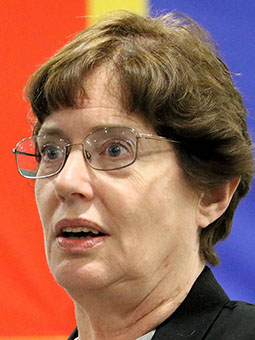 WeddellA new study offers a more nuanced take on the nation’s religiously unaffiliated, and the findings show that Catholic parishes need to become more “outward facing” to reach those beyond the pews, an evangelization expert said.
WeddellA new study offers a more nuanced take on the nation’s religiously unaffiliated, and the findings show that Catholic parishes need to become more “outward facing” to reach those beyond the pews, an evangelization expert said.
“This is the managing of the journey out of Christendom,” said Sherry Anne Weddell, cofounder and executive director of the Colorado-based Catherine of Siena Institute. “And what we’re struggling with is, what does it mean now to function missionally outside of Christendom? That’s the transition.”
“Religious ‘Nones’ in America: Who They Are and What They Believe,” released Jan. 24 by Pew Research Center, found that about 28% of U.S. adults are religiously unaffiliated. Of that group, which has been dubbed the “nones,” 63% described their religion as “nothing in particular,” with 17% saying they were atheist and 20% saying they were agnostic.
The Pew data reveals a more complex view of “nones,” exploring their views of God, religion, morality, science and spirituality.
Broadly, researchers found that most “nones” believe in the God of the Bible (13%) or another higher power (56%), but few attend religious services regularly: 90% said they “seldom” or “never” do.
Pew researchers noted that “nones” are “not uniformly anti-religious,” allowing that religion can do either equal amounts of harm and good (41%) or more good than harm (14%), although most “nones” maintain that religion does more harm than good (43%).
The “nones” — a roughly even mix of women (47%) and men (51%) — are a younger population, according to Pew, with 69% under the age of 50, and 31% of them 50 or older. In contrast, 45% of U.S. adults who identify with a religion are under 50, and 55% are age 50 or older. Men are significantly more represented among atheists and agnostics.
Weddell sees the “nones” demographic as comprising “the generation of the sexual abuse scandals.”
“I’ve heard this over and over again: ‘My child was 18, when in 2002 … (clerical abuse scandals arose), and they’re old enough to understand it, and to get the kind of damage that it did and has done,’” said Weddell. “And since (2002), there’s just been all kinds of conflict within the Church. … Their peers are skeptical, and the culture they’re immersed in, especially online, is skeptical.”
The Pew study found that the top reason “nones” cited for their stance was doubt about religious teachings themselves (60%), with 32% naming a lack of belief in God or any higher power.
In addition, 47% of “nones” listed dislike of religious organizations and 30% pointed to negative experiences with religious people. In total, 55% of the “nones” said religious organizations, religious people or both were key reasons for being nonreligious. In 44% of the nones, a lack of need or time for religion was cited.
The Pew study also adds an important dimension to what the authors call the “complicated” link between religious disaffiliation and civic engagement. While “nones” tend to vote, volunteer and follow public affairs at lower rates, that lower level of involvement is “concentrated among ‘nones’ whose religion is ‘nothing in particular,’” rather than agnostic or atheist. In fact, the study said that “atheists and agnostics tend to participate in civic life at rates matching or exceeding religiously affiliated people.”
For Catholics, the challenge is now to focus on “two big starting points” for recalibrating their pastoral outreach to “nones” — those who may be in the pews and those beyond the church doors, said Weddell.
“We want to break the silence about the reality of a living relationship with God; we want to break the silence about Jesus,” she said.
The second “crucial” step is “serious, intercessory prayer for a change in the local spiritual climate,” joining with Christ, who is “interceding for every human being, and for the purpose of God in the fulfillment of the Father’s plan of salvation,” Weddell said.
Such prayer lifts the “secular haze” that “makes it very difficult for people to see and experience the presence of God,” she said.
The full report, “Religious ‘Nones’ in America: Who They Are and What They Believe,” can be found at stlreview.com/48UMAg6